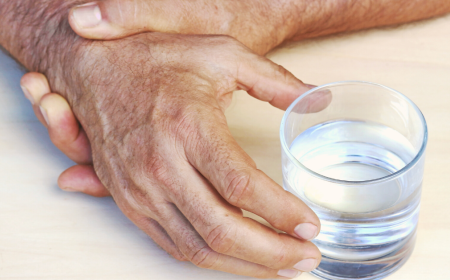To protect yourself and your loved ones, it’s essential to gain an understanding of the risk factors, treatment options, and preventive measures available.
In this article, find out more about what shingles looks and feels like at the different stages, and its connection with chickenpox. Also, learn all you need to know about managing and preventing a shingles outbreak:
- What is shingles?
- Preventing shingles with vaccination
- What causes shingles?
- How long does shingles last?
- What are the symptoms of shingles?
- Factors that increase your risk of shingles
- Potential complications of shingles
- Treatment for shingles
- Self-care tips for shingles recovery
- Where you can get the Shingrix vaccine
What is shingles?
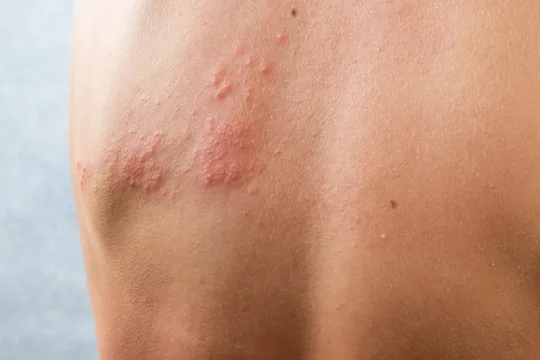
Shingles, also known as herpes zoster in medical terms, is a viral infection that is known for causing a distinctive blistering rash.
The rash initially emerges as small, red bumps that turn into fluid-filled blisters, and typically forms a band-like pattern on one side of the body.
While shingles is rarely life-threatening, it can be an extremely painful and distressing experience for affected individuals.
It’s estimated that Singapore sees 30,000 new shingles cases each year, with a higher incidence rate in adults aged over 50.
Preventing shingles with vaccination
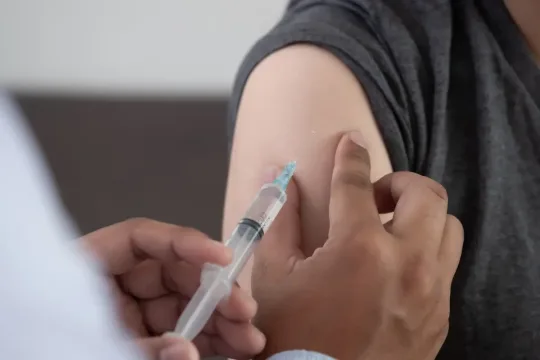
With vaccination, you can effectively protect yourself and your loved ones from a shingles outbreak.
Here are some key facts about the Shingrix vaccine:
- The vaccine is recommended for those over 50, and those with compromised immune systems.
- It is administered in two doses, to be taken two to six months apart.
- It provides individuals aged over 50, with over 90 percent protection from shingles and post herpetic neuralgia.
Yet to take your Shingrix vaccine? Set an appointment with our Family Medicine Clinic today!
What you can expect when taking your Shingrix vaccine
Common side effects of the vaccine include headaches and pain, soreness, swelling and itching at the injection site. If these side effects do not get better or become worse, please see a doctor.
What causes shingles?
Shingles is caused by the varicella-zoster virus, the same virus that also causes chickenpox.
Even after recovering from chickenpox, a person will carry the varicella-zoster virus for life. For most of us, the virus remains inactive in our nerve tissues without causing any issues.
However, as our immunity declines with age or illness, the virus can potentially reactivate and cause a painful condition known as shingles.
More than 90% of Singaporeans aged over 50 have had chickenpox and are carriers of the varicella-zoster virus, putting them at risk of shingles. Those in this age group are advised to consider vaccination as a preventive measure.
How long does shingles last?
Shingles typically takes about three to five weeks to run its course. However, the severity and duration of symptoms can vary significantly among individuals.
What are the symptoms of shingles?
Symptoms of shingles usually progress through the stages. Here's a breakdown of what to expect:
Early Stage Symptoms
This is the initial stage before the appearance of a rash. Affected individuals cannot spread the varicella-zoster virus to others as it is not yet active on the skin.
Early symptoms can present as:
- Localised tingly, painful sensations on or under the skin
- Fever
- Feeling unwell or cold
- Headache
- Light sensitivity
- Stomach discomfort
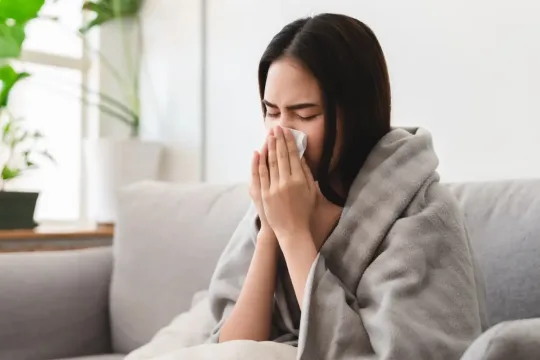
Early signs of shingles can often be mistaken for the flu because they share overlapping symptoms. However, the shingles pain is distinct. Affected individuals often describe it as a stinging, tingly, burning, stabbing, or prickly pain in a specific body area. In contrast, the flu causes a generalised muscle ache all over the body.
The intensity of pain varies from person to person. While some experience only mild discomfort, others may have pain so severe that it makes even gentle contact with the skin unbearable, disrupting their sleep and daily activities.
Symptoms at this stage typically last between one to three days.
Active Stage Symptoms
During the active stage, a cluster of red rash will form in the same location where the tingly sensations were felt. For individuals with darker skin tones, the rash may appear as pink, brown, greyish or purple bumps instead. Flu-like symptoms like fever, headache and an upset stomach may also persist.
The rash will develop into painful, fluid-filled blisters which may rupture open and ooze liquid. These blisters will typically form a single band on the left or right side of the body. Common areas where it may appear include the:
- Neck
- Back
- Waist
- Abdomen
- Chest
- Face (eye area)
- Genitals
- Buttocks
When to see a doctor
It's critical to see a doctor immediately when you first notice the rash, especially if it's near your eyes, as it could lead to permanent vision loss. Early medical intervention can help reduce the severity of your symptoms and prevent complications.

Risk of transmission in the active stage
Individuals who haven't been exposed to the virus can contract chickenpox from contact with the blisters. To prevent transmission, affected individuals should avoid physical contact with babies, pregnant women, and those with weakened immune systems.
After seven to ten days in this stage, the oozing blisters will start to scab over and heal.
Late Stage Symptoms
The blisters will begin to dry up and crust over at this stage, taking around two to three weeks to completely clear up. The majority of people will make a full recovery at this point.
Chronic Stage Symptoms
Not everyone experiences the chronic stage. It's known as post-herpetic neuralgia (PHN) and occurs as a complication in some individuals. It's characterised by persistent pain over three months after the blisters have healed. In some cases, the pain and discomfort can persist for more than six months, or even years.
Factors That Increase Your Risk of Shingles
Anyone who has had chickenpox is at risk of developing shingles later in life, but a shingles attack is most commonly triggered when the body’s immunity is compromised.
As such, factors that contribute to declining immunity can increase your risk of getting shingles.The most common risk factors include:
Age
Ageing is the most significant risk factor for shingles. As we age, our body’s natural immunity weakens, reducing its ability to fight off infections. This is why shingles affects more individuals aged over 50.
Chronic illness
Chronic diseases such as diabetes, heart disease, hypertension, asthma, and kidney or lung disease take a toll on the immune system, increasing the risk for individuals with these conditions.
Stress

Highly stressed individuals with poor mental health, or chronic sleep disorders like insomnia tend to experience weakened immunity, even in younger age groups. This puts them at an increased risk of a shingles attack.
Genetics
Those with a family history of shingles have a higher likelihood of developing the condition themselves.
Weakened immune system
Individuals undergoing treatments that suppress the immune system, such as cancer or organ transplant patients, face a heightened risk of shingles. Similarly, those relying on steroids or contending with weakened immune systems due to conditions like HIV or prior COVID-19 infections are also more vulnerable.
Studies suggest that those with a history of COVID-19 are 15 to 21 percent more likely to develop shingles, adding a layer of concern to their health journey.
Potential complications of shingles
Post-herpetic neuralgia (PHN)
Some individuals may develop a complication known as post-herpetic neuralgia (PHN), which is a persistent nerve pain that lasts even three months after the rash has disappeared. This is the most common complication and affects approximately 10 to 30 percent of those with shingles, with a higher incidence rate for those aged over 51.
Individuals grappling with PHN often endure not just physical discomfort but also emotional distress, including anxiety and depression, which can significantly diminish their quality of life. It's important not to suffer in silence. Seeing a doctor for a referral to a pain specialist is an option that can bring much-needed relief and support during this difficult period.
Skin infections
This occurs when the blisters rupture, allowing bacteria to enter the body through the broken skin. You may notice increased pain and redness, swelling, or pus on the affected area.
Individuals with weakened immune systems, and those who scratch at the blisters are more susceptible to this complication. To prevent getting infected, maintain good personal hygiene and keep the affected area clean and dry. If you suspect you have a bacterial infection, seek medical attention promptly for proper treatment.
Vision loss
When shingles appear on the face, it can spread to the eye and cause a complication known as herpes zoster ophthalmicus (HZO). This requires urgent medical attention as it can cause the cornea and retina to swell and scar, potentially resulting in permanent vision loss.
Pneumonia
Shingles can infect the lungs and cause pneumonia. Individuals with weakened immune systems are at an increased risk of this complication.
Encephalitis
This is a rare complication where the virus spreads and causes inflammation and swelling in the brain. It can present as headaches, fever, slurring, weakness, disorientation, and even seizures, depending on the brain region it affects.
Treatment for Shingles
Shingles can be treated with antiviral drugs, along with pain medications to help manage the discomfort.
Antiviral medication
Antivirals work by reducing the shingles virus load to help the immune system fight off the attack. They can help to speed up the healing process, reduce severity of symptoms, and lower the risk of complications.
As they are most effective when prescribed within 72 hours after the rash appears, early treatment is crucial for a better outcome.
Common antiviral medications for shingles include:
- Acyclovir
- Famciclovir
- Valacyclovir
Pain medication

Pain prescriptives commonly used to reduce pain and soothe the skin can include:
- ibuprofen for inflammation
- Antihistamines like Benadryl to reduce itching
- Topical gel or patches for pain relief
- Anticonvulsants or tricyclic antidepressants for nerve pain
Self-care tips for shingles recovery
Navigate your recovery process with these self-care tips, for a speedier and more comfortable aftercare experience.
Itch management : Try applying a cold damp compress or calamine lotion to soothe the itch, and provide relief from inflammation. Do steer clear of lotions containing oil and petroleum jelly, as they may trap moisture in the rash blisters, leading to a bacterial infection.
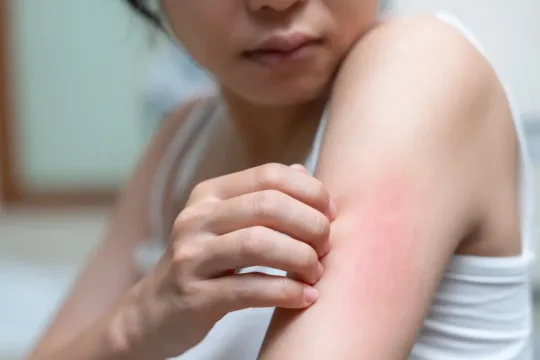
Eat healthy meals: Choose a balanced diet that includes foods like leafy greens, fish, berries, nuts, and whole grains. These foods are rich in antioxidants, vitamins, and essential nutrients that support a healthy immune system.
Rest and recuperate: Quality sleep is vital for proper healing. Remember, your body needs this time to recharge and recover fully. Not getting enough sleep can lower immunity and hinder your recovery, so prioritise rest as much as possible.
Prioritise stress management: Stress weakens your immune system. To soothe your nerves and boost your mental wellness, choose a calming activity you enjoy, such as music therapy or gentle stretching.
Wear comfortable clothing: Opt for loose-fitting, breathable garments that allow circulation around the affected area. Minimise scarring by avoiding clothes with scratchy textures that may aggravate the rash.
Monitor for Complications: Be alert for warning signs of potential complications, such as the spread of blisters to new areas, disorientation, higher fever, or persistent severe pain despite medication. Seek medical attention promptly if you experience any of these symptoms.
Where you can get the Shingrix vaccine
To effectively safeguard your health and that of your loved ones, choose the smart defence against shingles today and get vaccinated.
The Shingrix vaccine is available by pre-booking at NTUC Health Family Medicine Clinic. To ensure you're eligible for vaccination, schedule an initial consultation with one of our doctors.
Get in touch
Get the Shingrix vaccine at NTUC Health Family Medicine Clinic. For appointment booking and further inquiries, get in touch us here. Alternatively, you can contact us directly at 6281 2638.
References
- One in three adults will get shingles in their lifetime.
- Shingles risk higher in adults aged over 50
- Majority of adults over 50 years of age in Singapore carry the varicella-zoster virus.
- Shingles rash appearance can vary in darker skin tones
- Stress can negatively affect immunity
- Family history associated with a greater risk of herpes zoster
- Covid-19 infection increases risk of shingles
- PHN risk increases steeply with age
- Early treatment of shingles reduces the severity and duration of symptoms.

